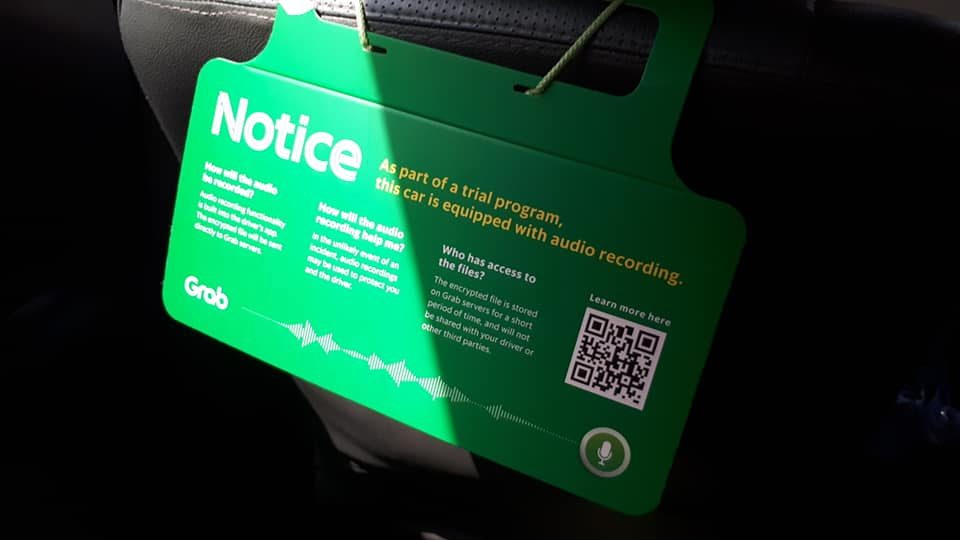SUMMARY
This is AI generated summarization, which may have errors. For context, always refer to the full article.

MANILA, Philippines – The National Privacy Commission (NPC) has suspended Grab Philippines’ selfie verification and pilot test of in-vehicle audio and video recording, saying this “may endanger the privacy rights” of the company’s passengers.
The NPC said in a statement on Tuesday, February 5, that it “has issued a Cease and Desist Order (CDO) to Grab Philippines, Inc. (Grab PH) after finding deficiencies in complying with the Data Privacy Act of 2012 (DPA) for three personal data processing systems, which may endanger the privacy rights of the riding public.”
The systems: Grab earlier installed passenger verification via selfie as a security measure. If a passenger is unable to take a selfie, their identity may be verified by adding a credit/debit card.
On January 13, Grab rolled out in-car audio and video recording as a measure to assist in incident prevention and dispute resolution. The pilot program was meant to run for 2 to 6 weeks with over 180 GrabCar vehicles, half of which are equipped with in-car cameras and half with audio-recording systems.
According to Grab, passengers who booked cars involved in this pilot test would be notified in advance through GrabChat, and could opt to cancel the booking without penalty.
The audio and video recordings would be encrypted and stored in Grab’s database for 7 days and 10 hours, respectively, only accessible by authorized Grab representatives in the event of an incident needing investigation.
Early reactions: On January 12, Grab user Ana Sanchez posted on Facebook that the GrabCar she was riding was equipped with audio recording, even without her explicit consent. She only noticed the sign 5 minutes into the ride.
“I did not stop the car midway, I just kept [quiet], in general, throughout the ride because I was uncomfortable at the thought of being recorded,” she told Rappler.
Sanchez reported her experience to the NPC for further investigation. According to Grab, no recording happened in this case since the pilot program started on January 13, and that the driver made the mistake of putting up the notice ahead of the pilot.
On January 14, the NPC announced that it had called on Grab to address the privacy concerns relating to the launch of their in-car audio and video recording systems. It issued a Notice of Deficiencies to Grab on January 31 after it “found several deficiencies” in the 3 systems.
The deficiencies: The NPC said on Wednesday that Grab “did not sufficiently identify and assess the risks posed by these systems on the rights and freedoms of the data subjects.”
“Only the risks faced by the company were taken into account” in its Privacy Impact Assessment (PIA), the NPC said.
The NPC notice also said that “the video recording system will also enable Grab employees to monitor the situation live from the Grab Office and take photos of what is happening inside the vehicle, once the driver prompts the office through an emergency button.”
The NPC noted that the public was not informed about the collection and release mechanisms of the 3 systems – that these would be released upon request to police authorities in the event of a dispute, conflict, or complaint – through Grab’s privacy notice and privacy policy.
The NPC noted that Grab “also failed to mention its legal basis in processing the collected data.”
“The documents submitted to the NPC were also found to be insufficient to establish whether the company’s data processing was proportional to its intended purpose; whether the benefits of the processing outweigh the risks involved; nor whether the processing was the best among considered alternatives to achieve the underlying purpose,” it said.
Moreover, the NPC found that the option to withdraw consent was not sufficiently communicated to passengers through GrabChat. “It was also unclear if and hor data processing will be affected upon such withdrawal of consent,” the NPC added.
What happens next: Grab is required to comply with remedial measures within 15 days, as directed by the NPC. The suspension of the systems would be in place until the company addresses the deficiencies. – Rappler.com
Add a comment
How does this make you feel?
There are no comments yet. Add your comment to start the conversation.